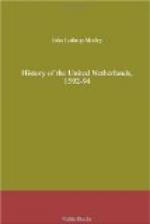This was the plan of Father Odo for putting Philip on the throne of France, and at the same time lifting up the downtrodden Church, whose priests, according to his statement, were so profligate, and whose tenets were rejected by all but a small minority of the governing classes of the country. Certainly it did not lack precision, but it remained to be seen whether the Bearnese was to prove so very insignificant an antagonist as the sanguine priest supposed.
For the third party—the moderate Catholics—had been making immense progress in France, while the diplomacy of Philip had thus far steadily counteracted their efforts at Rome. In vain had the Marquis Pisani, envoy of the politicians’ party, endeavoured to soften the heart of Clement towards Henry. The pope lived in mortal fear of Spain, and the Duke of Sessa, Philip’s ambassador to the holy see, denouncing all these attempts on the part of the heretic, and his friends, and urging that it was much better for Rome that the pernicious kingdom of France should be dismembered and subdivided, assured his holiness that Rome should be starved, occupied, annihilated, if such abominable schemes should be for an instant favoured.
Clement took to his bed with sickness brought on by all this violence, but had nothing for it but to meet Pisani and other agents of the same cause with a peremptory denial, and send most, stringent messages to his legate in Paris, who needed no prompting.
There had already been much issuing of bulls by the pope, and much burning of bulls by the hangman, according to decrees of the parliament of Chalons and other friendly tribunals, and burning of Chalons decrees by Paris hangmen, and edicts in favour of Protestants at Nantz and other places—measures the enactment, repeal, and reenactment of which were to mark the ebb and flow of the great tide of human opinion on the most important of subjects, and the traces of which were to be for a long time visible on the shores of time.




